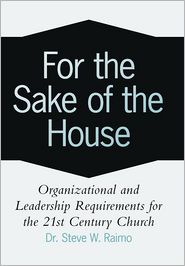Barna reports that 1,500 men and women leave vocational ministry each month due to stress, conflict, or moral failure. Is it possible that our organizational governance structures (polity) and leadership styles lend themselves to this travesty?
Is there a better way of leading? Is there a better way to provide governance for the church organization?
Now available through CrossBooks.com, BarnesandNoble.com, and other on-line sites . . . For the Sake of the House is written especially for those in church leadership or those in leadership in other religious organizations. However, it is relevant for anyone who is concerned about the Church of Jesus Christ and the impact we will have in the 21st century.
The message in this book is clear: times are changing, and we must change with them. The twenty-first-century church does and will continually face radical change and much uncertainty with undefined problems that require organizational models and leadership qualities and competencies far different from those that were successful in the twentieth century. It is our responsibility, as leaders of the church of Jesus Christ, to ensure we are adequately prepared and that those for whom we are responsible are also equipped as ministers of the gospel.
From an organizational perspective, structures and designs do not just happen. It takes much time, much effort, and many talented people. The changes the church faces are different now; they are discontinuous and not part of any pattern. Even the smallest changes can make the biggest differences, even if they go unnoticed for a time. For leaders, this may be confusing and troubling. But with proper preparation and foresight, with strategies, correct planning, and implementation, the local church organization will continue to flourish. The way we organize will determine our effectiveness. We need to be missionally responsive, culturally adaptive, organizationally agile multiplication movements.
From a leadership perspective, leaders are not born; they are developed through formal and informal training and experience. Titles and/or positions do not mean leadership skills, traits, and competencies are inherent in the individual. The church needs authentic, transformational servant leaders as it faces constant change and uncertainty—leadership that is not mired in traditions of yesterday or weighed down by personal egocentricities.
If we want to enjoy more of the opportunities and experience less of the risks, we need to be able to scan for, read, and interpret information that will affect us individually and the church as a whole. Those who understand why changes come and strategically plan for the unpredictable while strategizing for a preferred future waste less effort reacting and spend more time investing in being relevant and missional.


Thanks for the share! Very useful info!